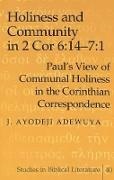Read more
This book examines 2 Cor 6:14-7:1 and argues that its theological message is communal holiness. It culminates in an attempt to posit a Pauline theology of corporate sanctification in the Corinthian correspondence. Paul's view of sanctification, it is argued, should be seen as multifaceted: relational, communal, ethical, and mission-oriented. Thus, a coherent picture of Pauline teaching on holiness in the Corinthian correspondence emerges from this book. For Paul, the focus of God's redemptive activity is, primarily, the community and not the individual. Paul's view on holiness has to do with communal holiness within the people of God, the goal of which is to make God known to the wider society. In sum, this book argues that the teaching on holiness should not be, and cannot be, satisfactorily explained in terms of the individual, but only as the individual stands in relation to the community of faith. Thus, the conclusion offers a corrective to some strands of modern interpretation that emphasize the individualistic, experiential aspects of Christian holiness, thus tending to reduce Christian holiness to morality.
Report
"Many studies of holiness from within the holiness movement in the Christian church tend to view the topic in terms of the relationship of individual believers to God and their growth toward personal perfection. J. Ayodeji Adewuya rightly recognizes that there is also a call to the church to be holy, as befits its status as the people of God, and in this book he develops this theme on the basis of a careful exegetical study of 2 Cor 6:14-7:1. This book is significant not only for its firm academic grounding of its thesis but also for its relevance to the life of Christian congregations as they seek to become all that God intends them to be." (I. Howard Marshall, Honorary Research Professor of New Testament, University of Aberdeen, Scotland)
"Scholars have long debated whether 2 Cor 6:14-7:1 actually fits either in the context of 2 Corinthians or within the larger Pauline corpus. Dr. Adewuya ably demonstrates that this passage fits well both in its literary context and within the larger Pauline theological context as an expression of Paul's theology of holiness. This serves as a welcome corrective to those who have assumed that Paul had little to say about personal holiness. I highly recommend this book." (Ben Witherington, III, Professor of New Testament, Asbury Theological Seminary, Lexington, Kentucky)
"Dr. Adewuya's reading of this notoriously difficult passage in Paul's 2nd Corinthians has been informed quite positively by his unique blending of African communal experiences and traditions with his thorough education in the historical methods of Euro-American exegesis. The result is the most illuminating and convincing contextualizing of this perplexing passage known to me. I urge all who seek to grasp more closely Paul's assumptions, strategies, and goals in his letters to the Corinthians to examine the treasures in this book with great care." (S. Scott Bartchy, Professor of Christian Origins and History of Religion, University of California, Los Angeles)

